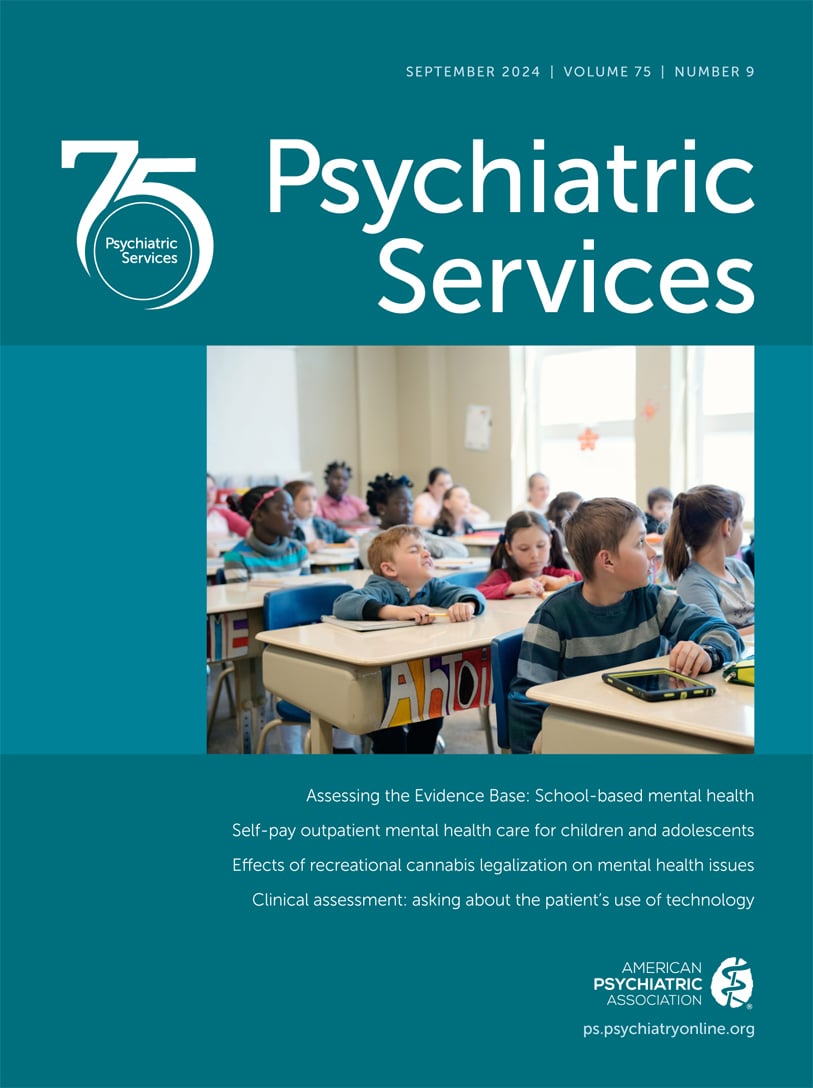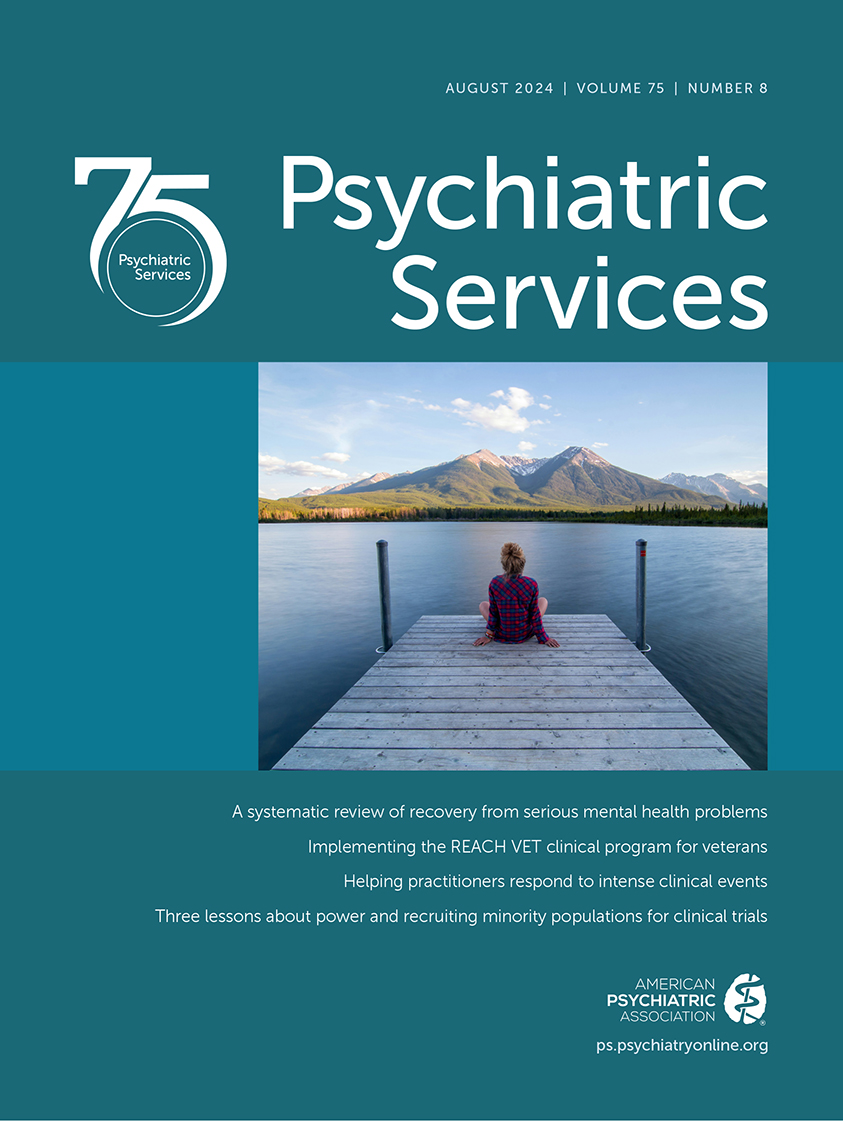Psychiatric Services
- Volume 56
- Number 10
- October 2005
Taking Issue
Departments
Columns
Article
Publication date: 01 October 2005
Pages1213–1222OBJECTIVE: Women with co-occurring mental health and substance use disorders frequently have a history of interpersonal violence, and past research has suggested that they are not served effectively by the current service system. The goal of the Women, Co-...
https://doi.org/10.1176/appi.ps.56.10.1213Publication date: 01 October 2005
Pages1223–1232OBJECTIVES: This study examined the 12-month cost of the array of services used by women with co-occurring mental health and substance use disorders and a history of violence and trauma who participated in the Women, Co-occurring Disorders, and Violence ...
https://doi.org/10.1176/appi.ps.56.10.1223Publication date: 01 October 2005
Pages1233–1236In 1998 the Substance Abuse and Mental Health Services Administration launched the Women, Co-occurring Disorders, and Violence Study (WCDVS). The WCDVS developed, implemented, and evaluated the outcomes and costs of comprehensive, trauma-informed ...
https://doi.org/10.1176/appi.ps.56.10.1233Publication date: 01 October 2005
Pages1237–1244OBJECTIVES: Few studies have sought to determine which specific supported employment services improve employment outcomes for people with pyschiatric disabilities. This study examined the effects of job development and job support among other services on ...
https://doi.org/10.1176/appi.ps.56.10.1237Publication date: 01 October 2005
Pages1245–1253OBJECTIVES: This five-site study compared Medicaid managed behavioral health programs and fee-for-service programs on use and quality of services, satisfaction, and symptoms and functioning of adults with serious mental illness. METHODS: Adults with ...
https://doi.org/10.1176/appi.ps.56.10.1245Publication date: 01 October 2005
Pages1254–1260OBJECTIVE: This study evaluated whether a supplementary skills training program improved work outcomes for clients enrolled in supported employment programs. METHODS: Thirty-five recently employed clients with severe mental illness who were receiving ...
https://doi.org/10.1176/appi.ps.56.10.1254Publication date: 01 October 2005
Pages1261–1268OBJECTIVE: This study operationalized and measured the external validity, or generalizability, of studies on mental health treatment and outcomes published in four journals between 1981 and 1996. METHOD: MEDLINE was searched for articles on mental health ...
https://doi.org/10.1176/appi.ps.56.10.1261Other Articles
Publication date: 01 October 2005
Pages1270–1273This article summarizes the scientific literature on the relapse process, describes the basic principles of relapse prevention treatment, highlights the major empirical studies, and offers suggestions for future research and application, especially in ...
https://doi.org/10.1176/appi.ps.56.10.1270Publication date: 01 October 2005
Pages1274–1281OBJECTIVE: This study documented rates of substance abuse relapse and explored factors associated with sustained remission among consumers with severe mental illness in a large, urban clinical sample. METHODS: Existing clinical records of consumers with ...
https://doi.org/10.1176/appi.ps.56.10.1274Publication date: 01 October 2005
Pages1282–1287OBJECTIVES: This study addressed the rate and predictors of substance abuse relapse among clients with severe mental illness who had attained full remission from substance abuse. METHODS: In a ten-year prospective follow-up study of clients with co-...
https://doi.org/10.1176/appi.ps.56.10.1282Publication date: 01 October 2005
Pages1288–1291OBJECTIVE: The authors conducted a qualitative, thematic analysis of focus group data to determine the strategies and supports persons with dual diagnoses rely on in their relapse prevention efforts. METHODS: Data from four focus group sessions conducted ...
https://doi.org/10.1176/appi.ps.56.10.1288Publication date: 01 October 2005
Pages1292–1296OBJECTIVE: Complex relationships among trauma, substance abuse, and mental disorders raise significant questions for the study of long-term recovery. The purpose of this qualitative study was to examine key themes in sustaining recovery among women with ...
https://doi.org/10.1176/appi.ps.56.10.1292Publication date: 01 October 2005
Pages1297–1302The authors review the literature on substance use disorders among persons with severe mental illnesses, including the other papers in this special section on relapse prevention, and suggest future directions. Although prevention of relapse to substance ...
https://doi.org/10.1176/appi.ps.56.10.1297Letters
Book Reviews: The Lobotomist and the Lobotomized
Book Reviews
News & Notes
Past Issues
View Issues Archive
Vol. 75 | No. 11

Vol. 75 | No. 10

Vol. 75 | No. 9
